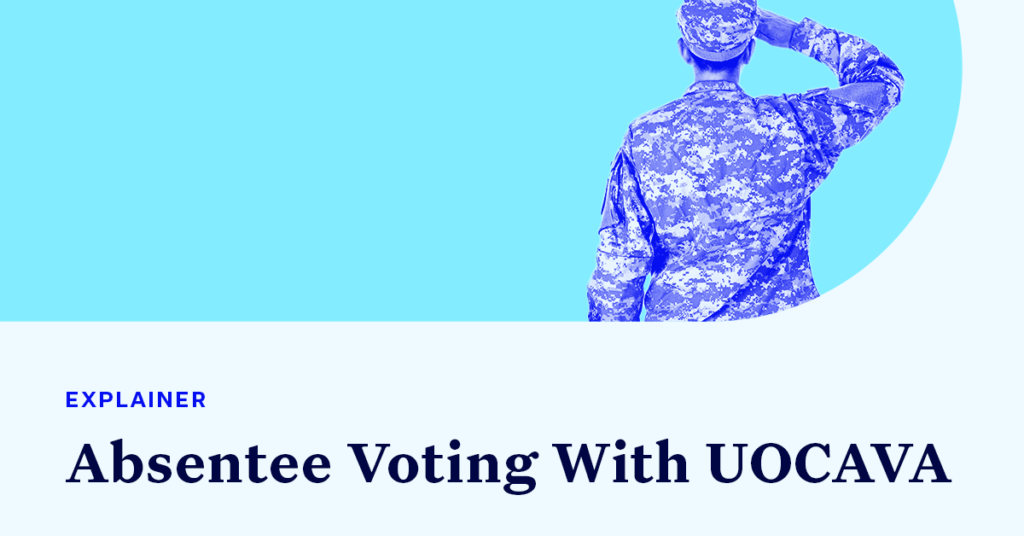How Military Members and U.S. Citizens Abroad Vote

Even with the rise in mail-in voting over the last decade, the majority of Americans in the 2020 presidential election voted in person, either on or before Election Day. But there are some Americans who find it especially difficult to vote in person — members of the military stationed away from their home and U.S. citizens who are living out of the country during an election. These voters have no other choice than to vote absentee. In today’s Explainer, we break down the federal law that protects these voters and ensures they’re able to vote absentee in federal elections.
What is the Uniformed and Overseas Citizens Absentee Voting Act?
The Uniformed and Overseas Citizens Absentee Voting Act (UOCAVA) is a 1986 federal law that guarantees the right of certain U.S. citizens to vote away from their polling location in federal elections. UOVACA applies to members of the military and their family members and citizens who are residing outside the United States.
UOCAVA created an application called the Federal Post Card Application for servicemembers and U.S. citizens to simultaneously register to vote and request an absentee ballot from the state where they are qualified to vote. If voters do not receive an absentee ballot from their state in time, UOCAVA also provides for a Federal Write-In Absentee Ballot that voters can use as a backup. Combined, these two tools are meant to ensure that Americans can still vote in federal elections even if they are away from their homes when serving in the military or living abroad on Election Day.
In 2009, Congress expanded and enhanced protections for UOCAVA voters by passing the Military and Overseas Voter Empowerment (MOVE) Act. This law amended UOCAVA to establish additional procedures all states must follow for voting in federal elections, such as:
- Giving UOCAVA voters the ability to register to vote and request and receive absentee ballots electronically, in addition to through the mail;
- Sending absentee ballots to UOCAVA voters no later than 45 days before a federal election;
- Accepting ballots from UOCAVA voters even if they don’t comply with a state’s rules for notarization or paper or envelope type
- And giving UOCAVA voters a way to track the receipt of their absentee ballots.
The MOVE Act also contains a mechanism that allows states to apply for a “hardship waiver” if they cannot comply with the law’s 45-day deadline. The application must explain why the state cannot meet the deadline and include a comprehensive plan to ensure UOCAVA voters from that state are still able to vote and have their vote counted.
Each state has different rules for how UOCAVA voters must return their completed ballots — some states allow these voters to vote via mail, fax, email or web portal while others require ballots to be returned via mail only. For further help with voting under UOCAVA as well as information about different state requirements, voters can visit the U.S. Department of Defense’s Federal Voting Assistance Program here.
How is UOCAVA enforced?
UOCAVA gives the U.S. attorney general the power to enforce the law by bringing lawsuits and other legal actions against states and jurisdictions that do not comply with its provisions. A list of enforcement actions can be found on the U.S. Department of Justice’s (DOJ) website here.
In 2010, the DOJ brought a lawsuit against the state of New York alleging that it had failed to comply with UOCAVA requirements to send absentee ballots in time for the November 2010 general election. As part of a 2012 court ruling, New York is generally required to hold its primaries for U.S. Senate and U.S. House races on the fourth Tuesday in June to ensure the state has ample time to send ballots to UOCAVA voters ahead of the general election in November.
How does UOCAVA impact voting rights litigation?
UOCAVA’s impact in litigation extends beyond enforcement actions taken by the DOJ. For example, the 2012 order establishing a June federal primary in New York played a role in the state’s redistricting litigation this year when a state court moved the primary for U.S. House races to August in order to have enough time to redraw the state’s previously overturned congressional map. The New York State Board of Elections ultimately obtained permission from the judge that issued the 2012 ruling to move the congressional primary to August.
Lawsuits this year in New Hampshire and Ohio also cited UOCAVA provisions as support for their legal arguments. For instance, a challenge to New Hampshire’s recently enacted Senate Bill 418 notes that the law changes the certification deadline for primary elections in ways that may make it impossible for New Hampshire to comply with UOCAVA’s 45-day deadline, burdening the voting rights of UOCAVA voters and thereby violating the New Hampshire Constitution. Similarly, Ohio Republican legislators cited the deadline to support their argument that there wasn’t enough time to challenge the state’s second congressional map prior to the primary election earlier this year.
Military members, their families and U.S. citizens outside the country all face unique challenges when exercising their right to vote. UOCAVA not only ensures these voters can have their votes counted in federal elections by protecting their ability to vote absentee, but also plays an important role in voting rights and redistricting litigation. While not as well known as the Voting Rights Act, UOCAVA is still one of our country’s foundational voting rights laws.